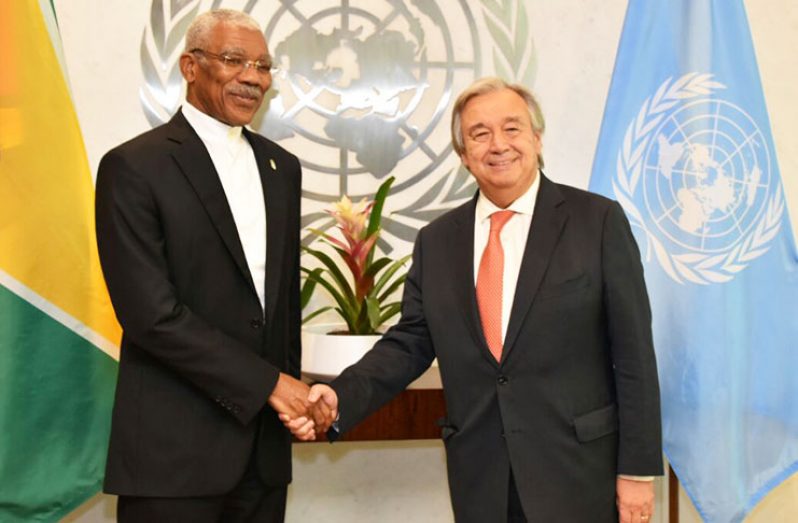— Guyana welcomes decision of UN Secretary-General
GUYANA has welcomed the decision by United Nations Secretary-General Antonio Gutteres to refer the Guyana/Venezuela controversy to the International Court of Justice (ICJ) and President David Granger looks forward to the re-confirmation of the 1899 Arbitral Award regarding Guyana’s western border.
In a special address to the nation Tuesday evening, President Granger said Guyana remains confident in the correctness of its case. The controversy arose out of Venezuela’s contention that the Arbitral Award was null and void
Earlier on Tuesday, Stéphane Dujarric, spokesman for the secretary-general stated that Mr Gutteres has fulfilled the responsibility that has fallen to him within the framework set by his predecessor, Mr Ban Ki-moon in December 2016, and has chosen the ICJ as the means to be used for the solution of the controversy.
He said in reaching this decision, the secretary-general has also reached the conclusion that Guyana and Venezuela could benefit from the continued good offices of the United Nations through a complementary process established on the basis of the powers of the secretary-general under the Charter of the United Nations.
President Granger in his address to the nation gave a reminder that Guyana’s position has always been that the basis of the controversy is a legal question, which should be resolved peacefully and conclusively through a legal process.
“Guyana will take all the necessary steps to ensure that its national patrimony will be protected for all time. Guyana remains committed to the peaceful settlement of disputes, respect for international agreements and treaties and to maintaining friendly relations with its neighbours,” the head of state said.
“Guyana will pursue the path ahead in furtherance of the preservation of its sovereignty and territorial integrity with quiet confidence and with the assurance in ever-improving relations with its neighbours, Brazil, Suriname and Venezuela,” the President said.
PEACEFUL RELATIONS
The Ministry of Foreign Affairs also welcomed the decision. The ministry in a statement said Guyana will not allow factors extraneous to the controversy to influence its referral to the court, rather, it will continue the advancement of peaceful relations with Venezuela whose people are the brothers and sisters of Guyanese. It said that Guyana acknowledges the secretary-general’s suggestions for the immediate future.
In addition, the ministry stated that Guyana has stood firmly against Venezuela’s attempt to re-open a territorial boundary settled and recognised for half a century before its independence, and done so despite the manifest unequal strengths between the two countries, is to her national credit.
“Guyana, as one of the world’s small developing countries, is pleased that its reliance on the rule of law internationally has been the underpinning of its national sovereignty,” the Foreign Affairs Ministry said.
The ICJ will make a final ruling in keeping with the tenets of the 1966 Geneva Agreement.
Former UN Secretary-General Ban Ki-moon and Mr. Guterres, in keeping with the 1966 agreement, agreed to refer the Guyana/Venezuela border controversy to the ICJ if significant progress was not made in arriving at a full agreement for the settlement of the controversy at the level of the Good Offices process.
Venezuela is claiming that the 1899 Arbitral Tribunal Award, which had given more than 90 per cent of an area to then British Guiana (now Guyana), is null and void.
FIRM VIEW
Approximately 118 years after that award was issued, the Guyana Government holds strongly to the view that a juridical course of action is the only means through which this matter can be permanently resolved. For more than two years, the government has been seeking to reach a peaceful resolution to the border controversy.
Foreign Affairs Minister Carl Greenidge told the Guyana Chronicle recently that the ministry was enhancing its legal standing in the lead-up to the decision.
He said for the purpose of “enhanced mediation” at the level of the United Nations, Guyana has retained the services of a U.S.-based law firm – Foley Hoag LLP. Foley Hoag was the same law firm that successfully spearheaded the case for the Government of Guyana in the maritime boundary matter with Suriname.
“The advantage of that is that they know the history and they are familiar with the issues,” Minister Greenidge posited, while noting that through the firm, lawyers have been providing Guyana with advice on “negotiations and pitfalls”.
He had stated that once the matter is referred to the ICJ, the legal team will be expanded.
“It is expected that once the process at the ICJ starts, we will have to retain additional skills both for the formal presentation and also in terms of the preparation,” the foreign affairs minister explained.
The government has set aside US$15M for legal fees in this regard.




.png)









